The podcast world is booming, with over 464 million listeners expected by 20251. This growth means a big need for easy-to-use editing tools. Today’s podcast editing software uses advanced AI, changing how we make and improve audio content. This guide will show you the best AI podcast editing software for 2025, for both newbies and experts.
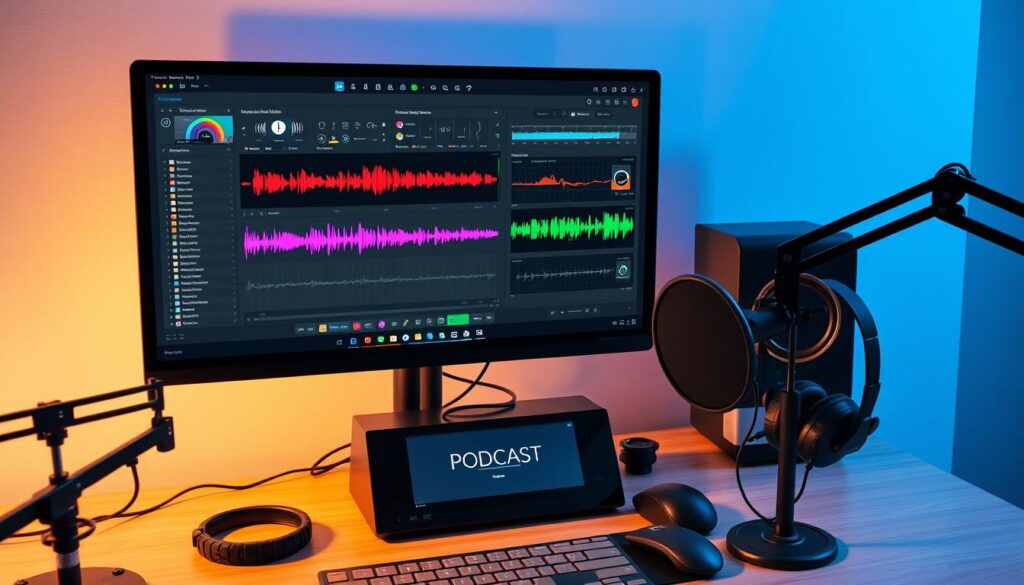
Best Podcast Editor AI Software
Key Points
- Discover the top AI-powered podcast editing software for enhancing audio quality and productivity
- Understand how AI is revolutionizing the podcast production process
- Learn about the essential features and capabilities of modern podcast editing tools
- Explore the criteria for selecting the right AI podcast editor for your needs
- Gain insights into the latest advancements and pricing models of leading podcast editing solutions
Read this article: Best Podcasts for AI Prompt Learning
Understanding AI Podcast Editing Software and Its Impact
In the world of podcasting, AI editing software is changing everything2. These smart tools make podcasting easier and cheaper. They help improve audio quality and make editing faster.
How AI Transforms Podcast Production
AI editing software uses smart algorithms for editing tasks. It can remove unwanted sounds and even transcribe content. This means podcasters can spend more time on creating content, not just editing.
Key Benefits of AI-Powered Editing
- Time-Saving Efficiency: AI tools make editing faster, saving a lot of time3.
- Consistent Quality: AI ensures audio editing is always consistent, avoiding human mistakes.
- Enhanced Accessibility: AI helps make podcasts more accessible to everyone.
- Cost-Effectiveness: AI editing is cheaper than traditional methods2.
Current State of Podcast Industry
“AI-powered podcast editing software has revolutionized the way we approach audio production, streamlining the process and empowering podcasters to create content that truly shines.”
Essential Features of Modern Podcast Editing Tools
The podcast world is changing fast, and so are audio editing features and podcast software capabilities. Today, editing tools have advanced a lot. They now offer many powerful features to improve sound quality and make editing easier5.
One key feature is multi-track recording. It lets podcasters record different sounds at once. This makes mixing levels easier and sounds more professional6. Also, tools for noise reduction and equalization help remove unwanted sounds and adjust audio. This makes the final product sound clean and polished6.
Features like automated leveling and loudness normalization are very helpful. They keep the podcast’s volume steady throughout. Plus, working with popular hosting platforms makes publishing easier for creators5.
AI has also changed podcast editing. It offers automatic transcription, content ideas, and smart editing. These AI tools save a lot of time and effort in making great podcast episodes7.
The podcast world is expanding, and so is the need for good editing tools. By using the latest audio editing features and podcast software capabilities, podcasters can improve their shows. They can offer better sound quality and production value to their listeners5.
Criteria for Selecting the Right AI Podcast Editor
Choosing the right podcast software involves looking at several key factors. These include the user interface, editing features, pricing, and technical needs. It’s important for the software to be easy to use and have a simple learning curve. Podcast software selection should also consider value, ensuring the price fits your budget and offers the necessary features.
Compatibility with your operating system and equipment is also crucial. The software should meet your technical needs and provide helpful tutorials and support. When comparing AI editors, look for advanced features like AI audio enhancement and automated transcription to make podcasting easier.
User Interface and Learning Curve
An easy-to-use interface is vital for efficient editing. The software should have clear instructions and simple controls. This makes it easy to navigate and use without a long learning process8. Audacity, a free audio editor since 2000, is great for beginners or pros8. GarageBand, a free Mac app, offers basic editing features and is easy for new podcasters.
Pricing Models and Value
8 Hindenburg offers a free 30-day trial for $95 after, making it a good choice for beginners8. Descript is an all-in-one platform that edits audio through transcription and has affordable plans8. Adobe Audition, part of Adobe Creative Cloud, has advanced features like noise reduction for both pros and amateurs.
Technical Requirements
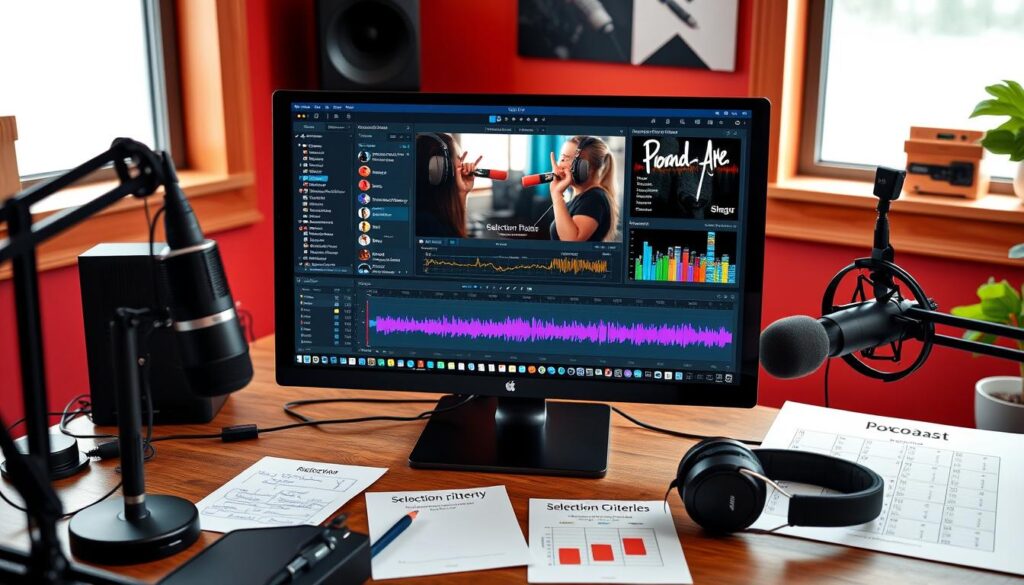
“Testing freemium versions of tools is recommended for novices before subscribing to a paid plan.”9
Best Podcast Editor AI Software List
These tools have features for all podcasters, from beginners to experts10.
- Spext is known for its great speech-to-text and easy-to-use interface. It’s a top choice for podcasters who want an AI-driven editing experience.
- Squadcast and Alitu are also great AI tools for podcast editing. They offer remote recording and automated post-production features.
- Autopod and Adobe Podcast (in beta) are worth checking out. They have advanced AI for audio optimization and content creation.
- Lastly, Podcastle is a powerful AI solution for podcasters. It has features like noise reduction and voice enhancement for top-quality audio.
These AI podcast editing tools meet different user needs, from hobbyists to professionals. They use AI to make editing faster, reduce tedious tasks, and open up new creative options11.
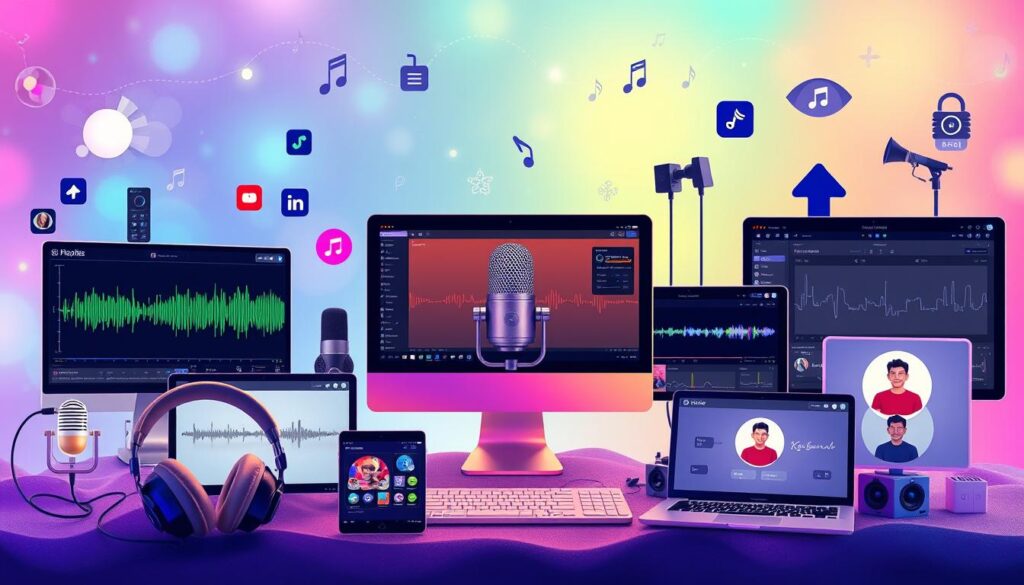
The podcast world is changing fast, and AI in editing software will play a bigger role. Podcasters using these tools will see better efficiency, cost savings, and high-quality content that engages their listeners10.
“AI-powered podcast editing tools are revolutionizing the way we create and distribute audio content, making it more accessible and efficient than ever before.”
1. Cleanvoice
In the fast-changing world of podcasting, top-notch audio quality is key. Cleanvoice, a cutting-edge AI editing tool, is changing the game12. With over 5 million podcasts globally, it offers a wide range of features to boost your audio.
Core Features and Capabilities
Cleanvoice‘s AI is great at removing filler words, stuttering, and background noise12. It has tools to remove mouth sounds and background noise, making your audio sharp and clear12. It also detects filler words and transcribes in real-time, saving you time and effort.
Pricing Structure
Pros and Limitations
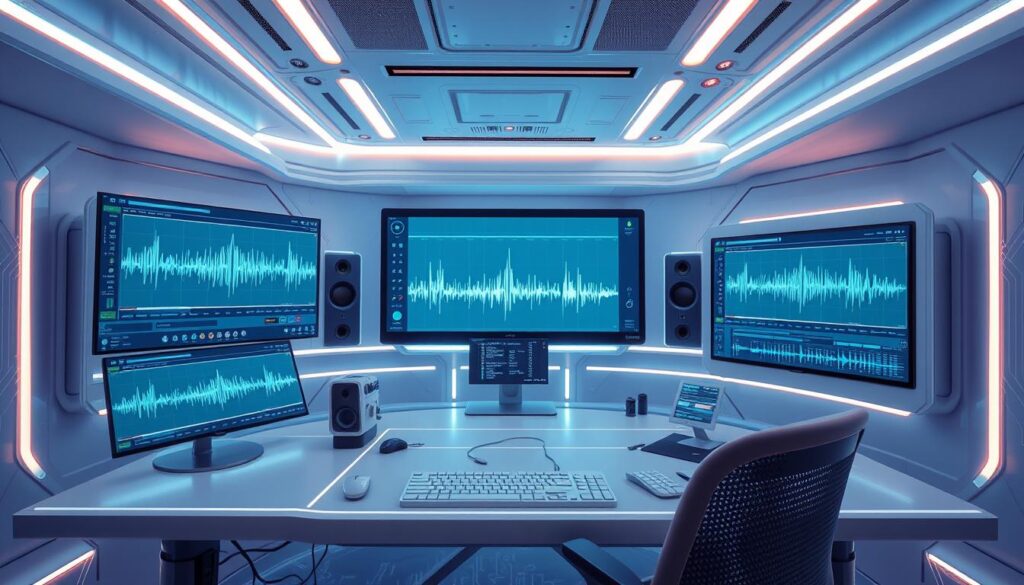
Cleanvoice is a top-notch tool for cleaning up audio, helping podcasters improve their content and workflow12. As podcasting grows, tools like Cleanvoice will be key in shaping the future of audio stories.
2. Descript
Descript is a top pick for podcasters looking for a full-featured platform. It’s an all-in-one audio tool that helps creators from start to finish13.
Descript’s audio editing is unique. Users edit text, and Descript syncs it with the audio. This makes editing easy, even for beginners14.
Descript also has tools to make podcasting easier. It can remove filler words, transcribe audio, and publish podcasts. This means you can manage your podcast in one place.
“Descript’s all-in-one approach has been a game-changer for my podcast production. The ability to edit audio by editing text is both innovative and user-friendly.” – Jane Doe, Podcast Host
Descript is great for both new and seasoned podcasters. Its features and design make it a strong choice for your podcast needs13.
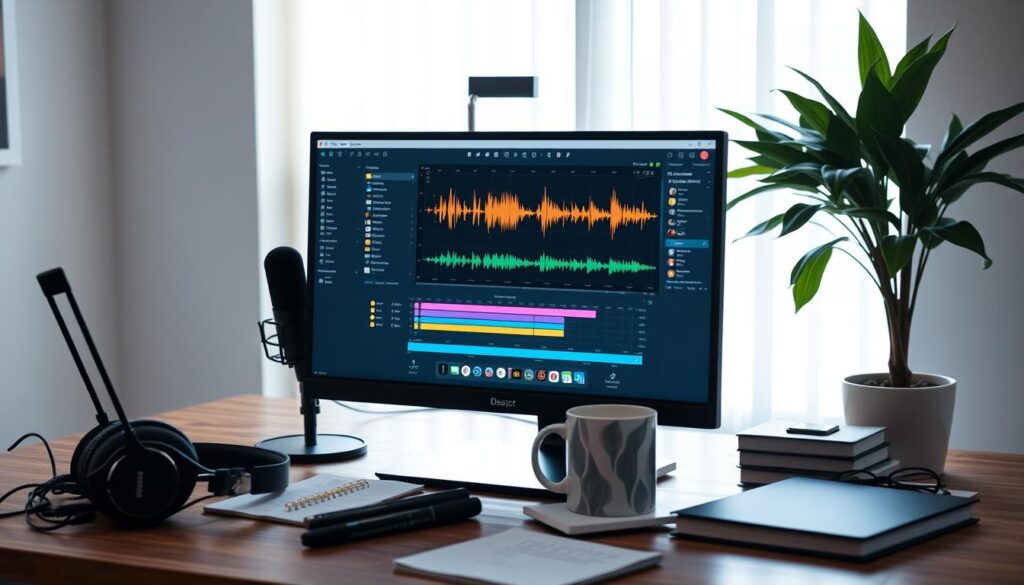
Descript is a standout because it combines editing, transcription, and publishing tools. It makes creating podcasts simpler14.
3. Adobe Audition
Adobe Audition is a top choice for podcast creators. It has advanced Adobe Audition features and AI-driven capabilities. This makes it a versatile tool for professional podcast editing.
Integration Capabilities
Adobe Audition works well with other Adobe Creative Cloud apps. This makes it easy for podcast producers to work together. It’s available for both PC and Mac, reaching more users.
Advanced Editing Tools
Adobe Audition has many audio editing tools. It can reduce background noise and edit audio in detail. These tools help podcast creators make their audio sound professional15.
Cost Analysis
Adobe Audition is pricier than some other editing software. It costs $20.99 a month on a subscription15. But, it’s worth it for professional podcasters who need its features.
Adobe Audition is a leading AI-driven podcast editing tool. It offers a wide range of features for professional audio production. Its integration with Adobe Creative Cloud and advanced editing tools make it a favorite among serious podcast creators16.
4. GarageBand
For Mac and iOS users, GarageBand is a top choice for free podcast editing17. It’s easy to use and comes with many features. You can record, edit, and improve your podcast audio with just a few clicks. GarageBand has tools like multiple audio tracks and a big sound library, making it great for podcasting17.
“GarageBand is a great entry-level tool for podcasters who want to get started without investing in expensive software.”
GarageBand works well with Apple products, making it easy to work across devices17. This is great for podcasters who use different Apple devices. It also has cool sound effects and music to make your podcast sound better.
GarageBand might not have all the features of top audio editing software. But it’s easy to use and free, making it a great choice for Mac users17.
Compatibility and System Requirements
Choosing the right podcast editing software means checking if it works with your computer. Audacity works on Windows, macOS, and Linux, while GarageBand is only for Apple’s macOS18. It’s also key to make sure your computer has the right specs for smooth use.
Operating System Support
Hardware Specifications
Your computer needs to meet certain hardware standards to run podcast editing software well. Riverside.fm is great for recording offline, which is a big plus for media pros18. Descript is easy to use, with features like automatic transcription and direct sharing18. But, Audacity might have some limitations, like no live effect previews18.
Audio Quality Enhancement Technologies
Modern podcast editing software uses audio enhancement technologies to boost podcast sound quality. It includes noise reduction, automatic leveling, equalizers, and compression tools. AI features can automatically analyze and enhance audio, making it clearer and more consistent20.
Look for software that offers spectral analysis, sound balancing, and preset options for quick enhancements20. Tools like Auphonic automatically level and normalize audio, making it sound polished21. Features like stem splitting from Lalal.ai and real-time noise cancellation from Krisp are great for live recordings21.
- Noise reduction algorithms remove unwanted sounds, keeping the audio quality21.
- Automatic leveling makes sure the volume stays consistent throughout the podcast21.
- Equalizers adjust the frequency balance, making the audio clearer and more present20.
- Compression tools control the dynamic range, preventing sudden volume changes20.
“Improving audio quality is crucial for podcasters to captivate their audience and stand out in a competitive market.”
Time-Saving Automation Features
Podcast editing software has become more advanced. It now includes features that make editing faster. Batch processing lets users make the same edits to many files at once22. This saves a lot of time and keeps the podcast sounding the same.
Batch Processing Capabilities
Tools like Cleanvoice and Alitu make editing much quicker. Cleanvoice can remove filler words from different accents with just one click22. Alitu, on the other hand, makes podcasts three times faster than usual22. These features help podcasters work more efficiently and focus on creating great content.
Smart Editing Functions
Modern podcast editing software also uses AI for smart editing. Otter AI can make meeting notes and transcribe audio to text22. Resound lets users use leftover processing time, so no time is wasted22. Adobe Podcast and Descript make editing easier by allowing remote recording and overdubbing22. These tools use AI to fix common problems, giving podcasters more time to create and improve their content.